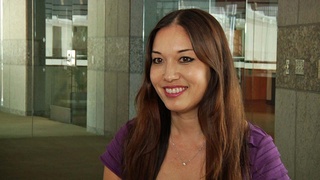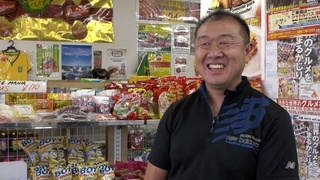Interviews
Brazilian of Japanese descents (Portuguese)
(Portuguese) Well, I don’t think it’s possible for us to separate, right? With our appearance, you can’t separate yourself and say, “I’m not Nikkei.” Not only because people, society, everyone who’s around you demands it. They very often call out, “Hey, Japanese, Japanese.” In reality they’re calling your Nikkei side, right.
So, I think that at a certain point in my life, and I can tell you that it was as a young person, we struggle a lot with this thing of being of Japanese descent. You enter the general society, right, in this case Brazilian society, and you want to be Brazilian like everybody else. In truth, I believe that because you are Nikkei, you do have some unique qualities, you have a culture that you inherited from your ancestors. So then, at a certain point, this becomes a strong influence in your life, right. And then my work, you know, has always been connected to the Japanese community. But, I just don’t think you can separate it. For me personally, I couldn’t separate it because I’d always be in conflict with myself.
So I think the great challenge in my life, from the time I was a young person all the way to the present, is how to bring these two sides together, and how to use these two parts in a creative way. In a way that contributes to society or to culture in general.
Date: October 7, 2005
Location: California, US
Interviewer: Ann Kaneko
Contributed by: Watase Media Arts Center, Japanese American National Museum.
Explore More Videos


Postwar school-life
(b. 1930) Half Japanese and grew up in both Japan and the United States.

On Challenging Institutions
(1938-2020) Japanese American attorney and civil rights activist

Pop and Balls
(1938-2020) Japanese American attorney and civil rights activist


Re-examining Identity
(1941-2018) Japanese Canadian photojournalist and activist

Fitting in to both sides of her family
Jewish Japanese American journalist




Conflicted about immigrating to America (Japanese)
(b. 1925) War bride

Defining "Nikkei"
(1941-2018) Japanese Canadian photojournalist and activist

The difference between Nikkei community in Oizumi and Brazil (Japanese)
(b. 1979) Sansei Nikkei Brazilian who lives in Oizumi-machi in Gunma prefecture. He runs his own design studio.

The term Nikkei (Japanese)
(b. 1979) Sansei Nikkei Brazilian who lives in Oizumi-machi in Gunma prefecture. He runs his own design studio.

Advantages of living in Japan (Portuguese)
(b. 1962) Japanese Brazilian owner of a Brazilian products store in Japan.
